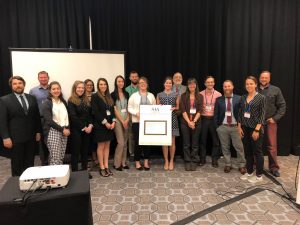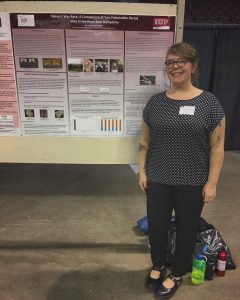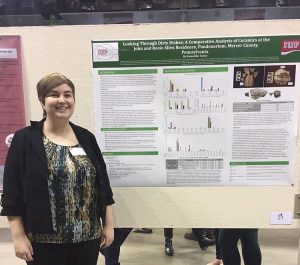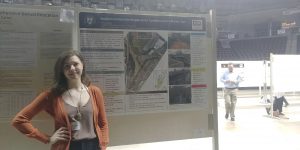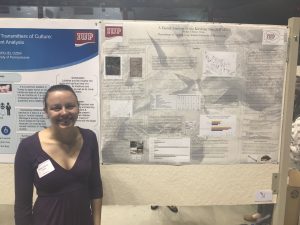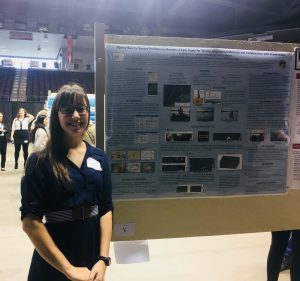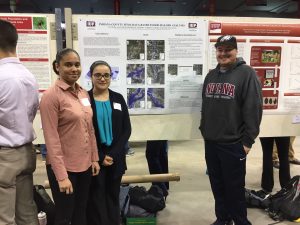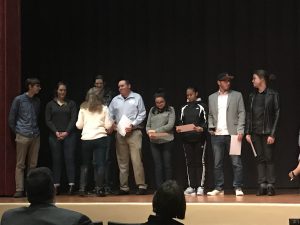By: Genevieve Everett
Employers should allow attendees/participants the Monday after the Society for American Archaeology (SAA) conference off. Let me tell you, I’m exhausted, but I’m feeling energized by all the amazing papers that I had the chance to hear, and the poster’s that were exhibited throughout the week.
Wednesday morning, myself, and 6 of my classmates (and luggage) crammed into the Arch Services van, and headed to the 83rd Annual SAA conference held in Washington, DC, in the lovely Woodley Park neighborhood. This was my first ever SAA conference. We arrive mid-afternoon at our small, but cozy Air Bnb that was located about a half hour (walk) from the conference center. After settling in a bit, we all walked to the conference center to register. We walked past yellow daffodils and purple flowers’ cascading down stonewalls, the first real sign of spring. One route we could take to and from the conference was through the National Zoo! After a delicious Lebanese meal (and cocktail), we all headed back to the Air Bnb to prepare for the first day of presentations, posters, and seeing old friends/colleagues.
Thursday morning was a BUSY day. I was up bright and early to go to Sami’s presentation on her thesis research at Pandenarium, a 19th century Freedman site in Mercer County, PA. This was one of her last presentations before she graduates in May! She did really great! Shortly after I wandered around the poster session, and was particularly interested in the Caves and Rockshelter posters. From there, I headed to watch our Ethics Bowl team debate Cornell University. The point of the Ethics Bowl is to put two teams from different universities in front of a panel of judges, and debate about hypothetical (and in some cases based on real events) ethical issues within archaeology. Our team did amazing, however, they did not make it to the final round. Later I walked around the Expo room browsing books and picking up free “swag”, and from there I stopped by to see Sami and Angie Jaillet-Wentling’s poster. They were presenting the results of the public archaeology days they held this past fall at Pandenarium, which contributed to the assemblage Sami was examining for her thesis.
The remainder of Thursday I spent alone, going from session to session. This past fall I helped excavate a quarry site in Northern Maine (if you go back to the September blog posts, you can read about it) under the supervision of Nathaniel Kitchel and Heather Rockwell. In the afternoon, Nathaniel presented a paper that the two co-authored on the results of this excavation. Next, I stopped by a talk in honor of Dennis Stanford. I especially enjoyed Ciprian Ardelean’s talk that was partially about working with Dennis Stanford, but also the Chiquihuite Cave in Zacatecas Mexico. Mr. Ardelean talked about being an “outsider” from Romania working in the Americas. He also talked about the importance of working with students. More specifically, the merit and value of getting dirty, working in isolation for so many days, being in nature and cooking and enjoying meals together. I really connect with this notion.
Friday I decided to head toward the Washington monument to see the Cherry Blossoms in full bloom. I did a loop around the Tidal Basin, dodging hordes of school groups. Despite the tourist traffic along the way, it was such a pleasant walk. I wanted to hit up the Natural History Museum, but again, it was swamped with school groups, so I turned around and headed back to the conference. I hit up a few more talks, had a drink with my mentor, and went out to Haikan, an amazing ramen place with some friends. The rest of the night was spent celebrating the fact that our classmate/friend Zaakiyah won the Paul Goldberg Award, a national award, awarded to a single MA student in either the geosciences or archaeology!
On Saturday, my main objective was to attend the symposium, “Wicked Awesome” Archaeology: New Data and Directions In The Archaeological Northeast”. A few friends/acquaintances were presenting during this session, including Dick Boisvert and Zachary Singer. Dick Boisvert is my mentor and is on my thesis committee. He talked about the legacy of the State Conservation and Rescue Archaeology Program (SCRAP). Following Dick, Zach discussed “New Investigations of the Paleoindian Component at the Templeton Site in Western Connecticut”. Much like SCRAP, students and volunteers help excavate the Templeton Site, which to me, is always a wonderful collaboration. After their talk I met up with my family, and we walked through the National Zoo. Later, we met up with my boyfriend, and grabbed dinner at a Mexican restaurant where delicious food and margarita’s were consumed.
Sunday, the final day of the conference, and the day of my presentation (at 8 am) in the “Government, Universities, and Heritage Stewardship: A Student and Young Professional Symposium”. I was in this symposium with several IUP classmates, some fellow PennDOT interns, and two graduate students from the University of Montana. My paper was titled, “From Field School to Graduate School: How One Public Archaeology Program Has Made It All Possible”. I discussed the benefits/legacy of SCRAP, and how I am using SCRAP data to complete my Master’s thesis. I also provided some preliminary results/conclusions to my thesis research. As my first time presenting at a conference, I have to say, I don’t think I bombed! I felt pretty confident up there, but that took A LOT of practicing over and over again. Everyone that participated in the symposium did great, and each person had a really interesting topic that related to their collaboration with state or federal government agencies. After our symposium, we jumped in the van, and headed back to Indiana.
Personally, the SAA’s were an amazing experience for me. Roughly 20 plus IUP students, past and present, attended the conference. In addition, three professors in the graduate and undergraduate Anthro department presented papers. It felt really good knowing that IUP had a strong presence, one that shows that we are a tight knit group, and that we are able to successfully transition from our undergraduate or graduate studies into viable careers in archaeology. Most IUP graduates are working in CRM, while some are getting their PhD’s. I hope that we can continue to show the archaeological community that we have a strong program for years to come. See you all next year in Albuquerque!!!




